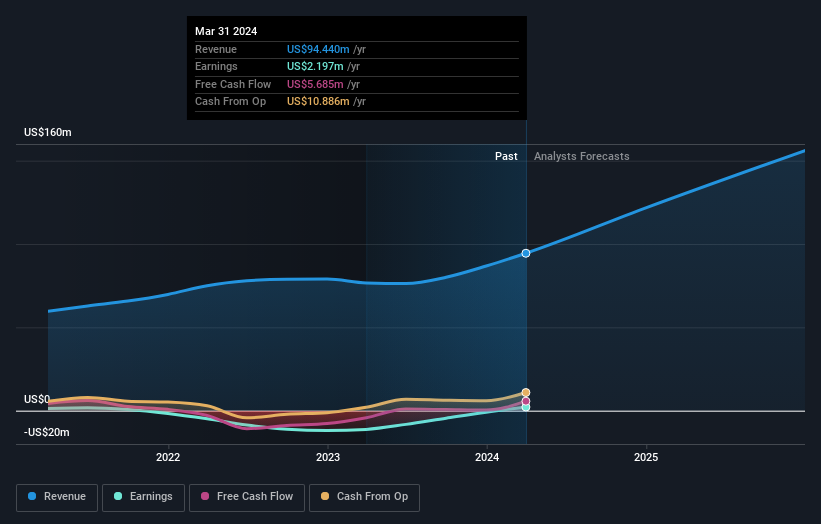individual investors who own 55% along with institutions invested in Innodata Inc. (NASDAQ:INOD) saw increase in their holdings value last week
Key Insights
Innodata's significant individual investors ownership suggests that the key decisions are influenced by shareholders from the larger public
42% of the business is held by the top 25 shareholders
If you want to know who really controls Innodata Inc. (NASDAQ:INOD), then you'll have to look at the makeup of its share registry. We can see that individual investors own the lion's share in the company with 55% ownership. In other words, the group stands to gain the most (or lose the most) from their investment into the company.
Individual investors gained the most after market cap touched US$426m last week, while institutions who own 38% also benefitted.
Let's delve deeper into each type of owner of Innodata, beginning with the chart below.
Check out our latest analysis for Innodata
What Does The Institutional Ownership Tell Us About Innodata?
Institutional investors commonly compare their own returns to the returns of a commonly followed index. So they generally do consider buying larger companies that are included in the relevant benchmark index.
Innodata already has institutions on the share registry. Indeed, they own a respectable stake in the company. This can indicate that the company has a certain degree of credibility in the investment community. However, it is best to be wary of relying on the supposed validation that comes with institutional investors. They too, get it wrong sometimes. It is not uncommon to see a big share price drop if two large institutional investors try to sell out of a stock at the same time. So it is worth checking the past earnings trajectory of Innodata, (below). Of course, keep in mind that there are other factors to consider, too.
We note that hedge funds don't have a meaningful investment in Innodata. Looking at our data, we can see that the largest shareholder is BlackRock, Inc. with 6.3% of shares outstanding. In comparison, the second and third largest shareholders hold about 5.5% and 5.1% of the stock. Furthermore, CEO Jack Abuhoff is the owner of 4.1% of the company's shares.
Our studies suggest that the top 25 shareholders collectively control less than half of the company's shares, meaning that the company's shares are widely disseminated and there is no dominant shareholder.
Researching institutional ownership is a good way to gauge and filter a stock's expected performance. The same can be achieved by studying analyst sentiments. There is a little analyst coverage of the stock, but not much. So there is room for it to gain more coverage.
Insider Ownership Of Innodata
While the precise definition of an insider can be subjective, almost everyone considers board members to be insiders. Company management run the business, but the CEO will answer to the board, even if he or she is a member of it.
I generally consider insider ownership to be a good thing. However, on some occasions it makes it more difficult for other shareholders to hold the board accountable for decisions.
Shareholders would probably be interested to learn that insiders own shares in Innodata Inc.. In their own names, insiders own US$29m worth of stock in the US$426m company. Some would say this shows alignment of interests between shareholders and the board. But it might be worth checking if those insiders have been selling.
General Public Ownership
The general public, mostly comprising of individual investors, collectively holds 55% of Innodata shares. This level of ownership gives investors from the wider public some power to sway key policy decisions such as board composition, executive compensation, and the dividend payout ratio.
Next Steps:
While it is well worth considering the different groups that own a company, there are other factors that are even more important. Be aware that Innodata is showing 2 warning signs in our investment analysis , and 1 of those makes us a bit uncomfortable...
Ultimately the future is most important. You can access this free report on analyst forecasts for the company.
NB: Figures in this article are calculated using data from the last twelve months, which refer to the 12-month period ending on the last date of the month the financial statement is dated. This may not be consistent with full year annual report figures.
Have feedback on this article? Concerned about the content? Get in touch with us directly. Alternatively, email editorial-team (at) simplywallst.com.
This article by Simply Wall St is general in nature. We provide commentary based on historical data and analyst forecasts only using an unbiased methodology and our articles are not intended to be financial advice. It does not constitute a recommendation to buy or sell any stock, and does not take account of your objectives, or your financial situation. We aim to bring you long-term focused analysis driven by fundamental data. Note that our analysis may not factor in the latest price-sensitive company announcements or qualitative material. Simply Wall St has no position in any stocks mentioned.
Have feedback on this article? Concerned about the content? Get in touch with us directly. Alternatively, email editorial-team@simplywallst.com

 Yahoo Finance
Yahoo Finance 

